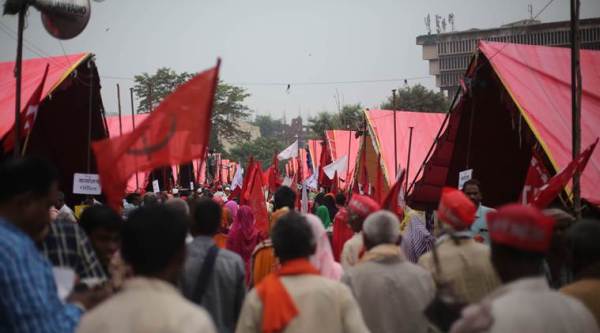 Apart from the three-week special session of Parliament, they are demanding the passage of two private member bills, on loan waivers and on assured procurement alongside MSP for farm produce. (Express photo)
Apart from the three-week special session of Parliament, they are demanding the passage of two private member bills, on loan waivers and on assured procurement alongside MSP for farm produce. (Express photo)
PHOTOGRAPHERS FOR farmers, lawyers for farmers, students for farmers and techies for farmers — these are some of a series of loose groups being formed across cities including Mumbai, Delhi, Chennai, Hyderabad and Pune in an effort to mobilise the support of the urban middle classes for issues pertaining to the deepening crisis in Indian agriculture.
Ahead of the CPM-All India Kisan Sabha’s proposed march of over one lakh farmers from across India to Delhi on November 29-30, these groups are pitching in with support through social media campaigns, awareness drives, posters, seminars and discussions in colleges and universities, in a bid to garner the support of educated, middle class Indians for the Kisan Sabha’s demand — a 21-day special session of Parliament to discuss the continuing agrarian distress.
The Kisan Mukti March, organised and supported by 200 organisations that comprise the All India Kisan Sangharsh Coordination Committee, is itself inspired by the success of the 200-km Nashik-Mumbai long march of Adivasi farmers this March, and the idea of roping in the support of urban folk is also inspired by the response of average Mumbai residents to the marching tribals as they arrived in the financial capital, a sea of red flags and caps, disciplined and organised despite their exhaustion.
Some of these urban supporters will eventually volunteer for and participate in the march to Delhi. On November 29, farmers are scheduled to gather at four locations on the outskirts of Delhi, from where they will march into the capital city. Apart from the three-week special session of Parliament, they are demanding the passage of two private member bills, on loan waivers and on assured procurement alongside MSP for farm produce.
Photojournalist and one of the founders of the Photography Promotion Trust, Sudharak Olwe, who’s driving the Photographers For Farmers initiative, says he hopes to see amateur and professional photographers document the journey that lakhs of farmers will make as they leave from their respective hometowns or villages on November 27, and then as they walk into Delhi on November 30. “Our mission is to empower farmers by gathering photographers from all around the country to contribute in the movement,” he said.
R Prabhu, a human resources professional with a technology firm in Chennai, said his group of volunteers in Techies For Farmers and Chennai For Farmers will print one lakh leaflets detailing the agenda for the march on November 29 and 30.
“We plan to disseminate these all over Tamil Nadu so that people can have better awareness on the issue. Some of us hope to join the group marching to Delhi as volunteers,” he said. Plans are also afoot among the group members to hold four meetings, along with farmers and others, at the district level in Coimbatore, Chennai, Madurai and Tiruchi.
While teachers, lawyers, doctors and other professionals and resident organisations in Mumbai, Pune and Nagpur have expressed their willingness to support the ‘Dilli Chalo’ movement, including making appeals to members to sign the online petition, talks are underway for seminars on agrarian issues to be held at city colleges, and through the political science department of Mumbai University.
Devidas Tulzapurkar, general secretary of the Maharashtra State Bank Employees’ Federation, said he has already sent a circular to all bank branches in the state requesting union members and others to endorse the petition online, in addition to physical copies of the petition being sent to branches.
“Bank branches will also display a poster in the premises with an appeal to join the movement,” said Tulzapurkar.